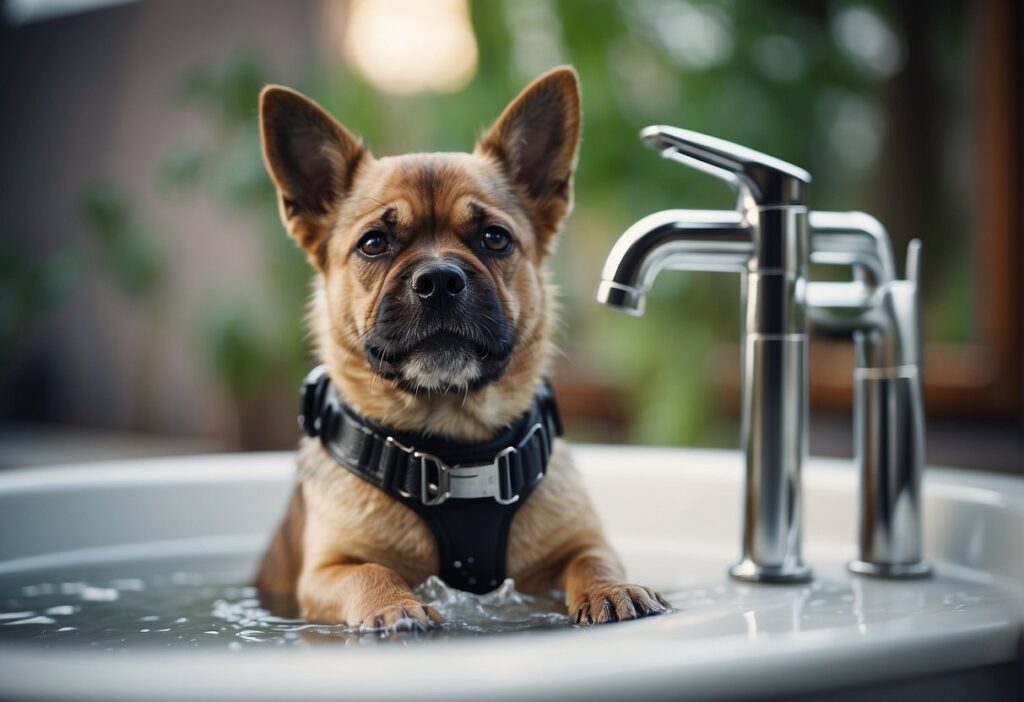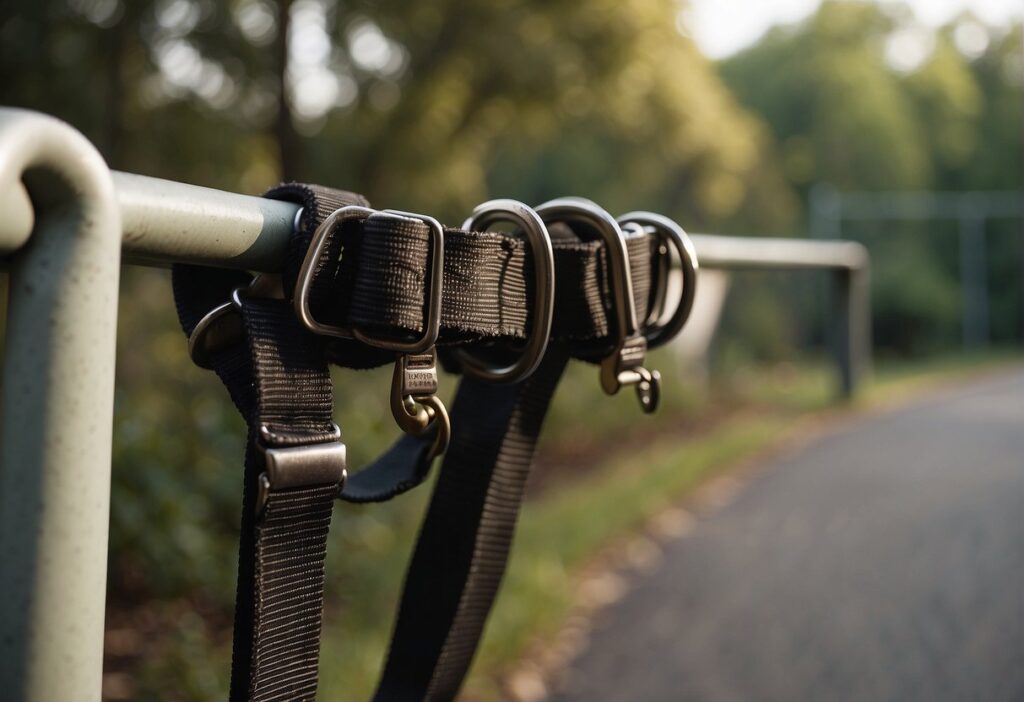Last updated on March 3rd, 2024 at 01:28 pm
Maintaining the hygiene of your dog harness ensures the comfort and health of your furry friend. Regular washing removes dirt, grime, and odors that accumulate over time. It’s an integral part of pet maintenance that keeps your companion happy and healthy.
The process of cleaning a dog harness involves simple materials and preparation. By following a few step-by-step instructions, you can effectively clean your pet’s harness at home. Proper drying and ongoing care after washing can extend the life of the harness and reduce wear and tear.
Recognizing when it’s time to replace your dog’s harness is crucial for safety and hygiene. Even with routine cleaning, harnesses can become too worn or damaged to function properly. Stay attentive to signs of wear and consult frequently asked questions to ensure best practices in harness care.
Key Takeaways
- Regular washing of your dog harness promotes pet health and comfort.
- Follow simple steps to clean and maintain the harness effectively.
- Know when to replace the harness to ensure your pet’s safety.
Materials and Preparation

Before jumping into washing your dog harness, understanding the type of material and preparing the correct cleaning agents and tools are key.
Understanding Harness Materials
Dog harnesses come in various materials, each with specific care instructions. Nylon harnesses are common due to their durability and ease of cleaning. Leather harnesses, while stylish, require different care—regular conditioning with a leather cleaner or saddle soap to prevent cracking.
| Material | Care Instructions |
|---|---|
| Nylon | Machine or hand wash with mild detergent. |
| Leather | Clean with leather cleaner and condition. |
| Rope | Hand wash with soapy water. |
Cleaning Agents and Tools
You’ll need the right cleaning agents and tools to safely clean your dog harness. A mild detergent or specialty soap is a must-have for most materials. For nylon or rope harnesses, a gentle cycle in a washing machine or a hand wash will do. Always opt for non-abrasive tools like a soft brush or cloth to apply soaps or detergents.
- Nylon/Rope: Mild detergent, washing machine or tub, soft brush.
- Leather: Leather cleaner, saddle soap, soft cloth.
Remember, the goal is to clean without damaging the harness, so avoid harsh chemicals and rough tools.
Washing Your Dog Harness Step by Step
Keeping your dog’s harness clean is essential for their health and hygiene. Follow these specific steps to ensure the harness is washed properly, preserving its material and ensuring long-lasting use.
Hand-Washing Techniques
To hand-wash your dog’s harness, start by preparing a cleaning solution of mild soap in a basin of cold water. Submerge the harness, allowing it to soak for around 10-15 minutes which will help break down any dirt. After soaking, gently scrub the harness with a soft brush or cloth, paying extra attention to heavily soiled areas. Rinse thoroughly under cold running water to remove all soap residue. Finally, pat the harness with a towel to remove excess water and hang it to dry in a well-ventilated area away from direct sunlight.
Machine Washing Tips
If your dog’s harness is machine washable, place it in a garment bag to prevent it from tangling. Select a gentle cycle and use a mild, pet-safe detergent. Opt for cold water to prevent any damage or shrinkage to the harness material. Once the wash cycle is complete, remove the harness from the bag and hang it to dry. Avoid using a dryer as the high heat may damage the harness.
Spot Cleaning and Treating Stains
For minor spots and stains, you don’t need to wash the entire harness. Instead, apply a pet-safe cleaning solution directly to the area and let it sit for a few minutes. Use a soft brush to scrub the stain away gently. Rinse thoroughly with cold water to remove any cleaning agent. If the stain persists, repeat the treatment before allowing the harness to air dry completely.
Drying and Maintenance

After washing your dog’s harness, it’s essential to dry it correctly and perform routine care to maintain its durability. Here’s how you can ensure your harness stays in great shape for years to come.
Proper Drying Methods
Once you wash your harness, air drying in a well-ventilated area is the safest method. For nylon dog harnesses, lay them flat or hang them up, avoiding direct sunlight which may degrade the material. Leather harnesses, on the other hand, should dry naturally away from heat sources to prevent cracking.
When you’re in a hurry, a low heat setting on a dryer can be used for nylon harnesses, but always consult the manufacturer’s directions. Be mindful that excessive heat can weaken the fibers, reducing the harness’s lifespan.
Routine Harness Care
Regular cleaning is key to preserving your harness. A quick inspection and cleaning after each use removes dirt and debris, preventing abrasive damage over time. To store the harness, choose a dry location away from direct sunlight to prevent fading and help maintain the integrity of the material.
For a handy overview, refer to this table:
| Material | Drying Method | Care Tips |
|---|---|---|
| Nylon | Air dry/low heat dry | Inspect regularly; store in a dry place |
| Leather | Natural air dry | Condition regularly; avoid heat and sun |
Recognizing When to Replace a Dog Harness

Your dog’s harness ensures safety during walks, but it does not last forever. Inspect the harness regularly for signs of wear that could compromise its integrity. Here’s what to look for to determine when it’s time for a replacement.
Durability has its limits. Check the stitching for loose threads and the fabric for tears or fraying. Buckles should fasten securely without signs of cracks or ease of release, and attachments require close examination for any deformation.
Noticeable wear isn’t the only reason to replace a dog harness. Prolonged use without proper cleaning can lead to skin irritations or infections. If the harness has an unusual smell or discolored patches, consider it a warning sign.
| When to Replace a Dog Harness | Signs of Wear |
|---|---|
| Immediately | – Buckles broken – Attachments deformed |
| As soon as possible | – Frayed webbing – Loose stitching – Persistent unpleasant odor |
| Monitor and assess | – Minor frays – Some loose threads – Discoloration |
Frequently Asked Questions
Maintaining your dog’s harness is essential for their comfort and safety. These FAQs focus on the best practices to clean and care for your dog’s harness, ensuring it stays in good condition.
How can you clean a smelly dog harness effectively?
To remove odors from a dog harness, hand wash it using a mild detergent. Soak the harness in a mixture of warm water and pet-safe cleaning solution, then rinse it thoroughly to avoid skin irritation for your pet.
What is the safest way to wash a dog harness in a washing machine?
Place the dog harness in a pillowcase or wash bag. Use a gentle cycle with cold water and a mild detergent. This method helps prevent damage to both the harness and your washing machine.
How often should a dog’s harness be cleaned for hygiene and safety?
Clean your dog’s harness every one to two months. Increase this frequency if your dog swims, rolls in dirt, or sweats heavily. Regular cleaning prevents the buildup of bacteria and unpleasant smells.
Can a dog harness be safely dried in a dryer after washing?
Avoid using a dryer, as the high heat can damage the harness. Instead, hang it to air dry away from direct sunlight. This keeps the fabric and fastenings in good shape.
What methods are best for removing dog hair from a harness?
Use a lint roller or tape to pick up loose hair. For stubborn hair, dampen a rubber glove, and rub it over the harness. The friction will clump the hair and make it easier to remove.
Are there any special instructions for washing Kong-brand dog harnesses?
Follow the manufacturer’s instructions for Kong harnesses. Typically, the manufacturer recommends hand washing in cold water with a mild soap. As with all harnesses, air dry after washing to maintain integrity.





